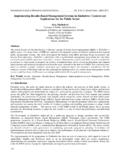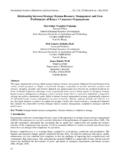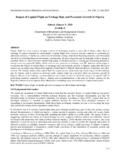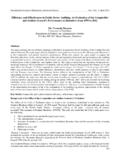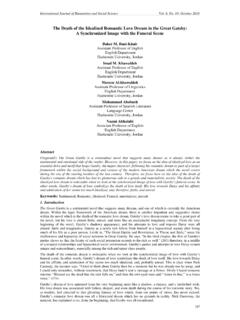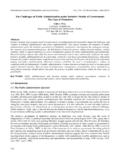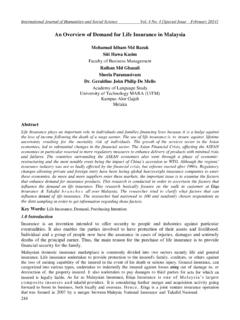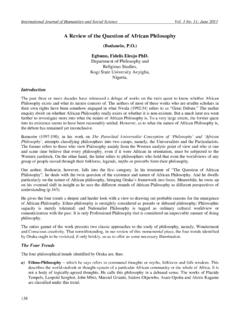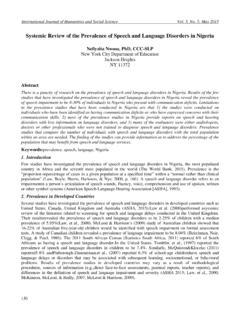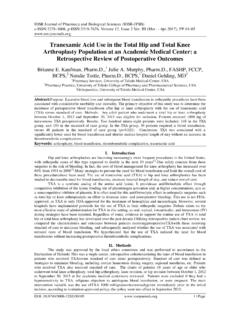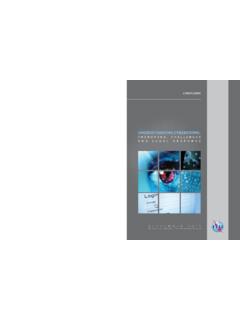Transcription of E-Government: Challenges and Opportunities in Botswana
1 International Journal of Humanities and Social Science Vol. 2 No. 17; september 2012 39 E- government : Challenges and Opportunities in Botswana Nugi Nkwe Department of Accounting and Finance University of Botswana Gaborone, Botswana Abstract Purpose The purpose of this paper is to examine the Challenges encountered in e- government implementation, as well as the potential Opportunities available in the context of Botswana society. Design/methodology/approach A detailed examination and analysis of Botswana 's published e- government vision and strategy is presented, together with a review of other relevant literature. Findings The findings and implications of this study reveal Botswana is still lagging behind in utilizing information and communication technologies for delivering government services online. Practical implications An understanding of the current status of e- government in Botswana can help policy makers in the country pursue development of the public sector organizations on the one hand, and would be of importance for Botswana 's economic future success on the other.
2 Originality/value This is believed to be the most up-to-date and comprehensive analysis of Botswana 's plans and assessment of its level of readiness for delivery of e- government services. Keywords: government , Service delivery, Botswana , Public Administration Article Classification: General Review Introduction The emergence of information communication technologies has brought a lot of changes to the way things are done in the world. These changes are across the spectrum; the way private companies do business, the way universities do things, the way governments provide services to their citizens and the way they interact with stakeholders at large. A visit to the government departments is a nightmare; it is characterized by a lot of paper work, long queues, bureaucracy, cramped spaces and a lot of frustrations .With the growing demands of citizens and changing global rules and regulations, governments are under pressure to deliver at the right time and quality.
3 Governments are trying to tackle the demand by re-engineering their processes and eventually ICT play a role in the proposed solution. ICT properly used, ICT has the potential to empower people to overcome development obstacles, address social problems, and strengthen democratic institutions. However, for a country to gain from the benefits of ICT, technology must be implemented and used effectively. The transformation to use of ICT to provide services by government ; e- government is slowly gaining ground across the world. E-governance, which is a paradigm shift over the traditional approaches in Public Administration, means rendering of government services and information to the public using electronic means. This new paradigm has brought about a revolution in the quality of service delivered to the citizens. It has ushered in transparency in the governing process; saving of time due to provision of services through single window; simplification of procedures; better office and record management; reduction in corruption; and improved attitude, behaviour and job handling capacity of the dealing personnel (Monga ,2008).
4 Centre for Promoting Ideas, USA 40 African governments have understood and appreciate the contribution of e- government to the government agenda. The 4th African Development Forum (ADF IV, 2004) has outlined the role of e- government as: E-Governance .. is an important innovation for enhancing good governance and strengthening the democratic process and can also facilitate access to information, freedom of expression, greater equity, efficiency, productivity, growth and social inclusion. Successful e- government initiatives can have demonstrable and tangible impact on improving citizen participation and quality of life as a result of effective multi-stakeholder partnerships. African governments need to develop policy frameworks, supported by legislation for e-Governance, that are linked to strategic development objectives For the Southern African case, countries such as Mauritius, South Africa, Mozambique, Botswana and Namibia have started putting in place institutional and regulatory frameworks solely dedicated for the advancement of e- government adoption (UN e-govt.)
5 Report, 2008). At the regional level, the SADC has sought to develop policies that may be adopted and further adjusted to suit the local contexts of individual countries (Bwalya K. J. and Healy, M. 2010) Botswana has a dedicated agenda towards promoting e- government because the leaders have understood the importance of e- government to an appreciable extent. Quoting from Mmegi Newspaper (2009, september ), the potential of e- government on improving the governance value chains in Botswana is explicitly outlined. For the case of Botswana , e- government delivers far greater stakeholder value when it is designed within the context of a broader service delivery reform agenda. This whole-of- government strategy leverages infrastructure, reduces cost and improves the on-line experience for clients. Scope of E- government While e- government encompasses a wide range of activities, we can identify three distinct areas.
6 These include government -to- government (G to G), government -to-citizens (G to C), and government to business (G to B), (Monga, 2008) government to citizen (G to C) facilitates citizen interaction with government , which is primary goal of e- government . This attempts to make transactions, such as payment of taxes, renewing licenses and applying for certain benefits, less time consuming and easy to carry out. government to Business (G to B) sector includes both the procurement of goods and services by the government as well as the sale of surplus government goods to the public on Line. (Mutula, 2012 ) In many respects, the government to government (G to G) sector represents the backbone of e- government . It is felt that governments at the union, state and local level must enhance and update their own internal systems and procedures before electronic transactions with citizens and business are introduced.
7 government to government e- government involves sharing data and conducting electronic exchanges between various governmental agencies (Monga, 2008) Literature Review Definition Many studies have defined e- government in different ways: Coleman (2006) has defined e- government as the combination of electronic information-based services (e-administration) with the reinforcement of participatory elements (e-democracy) to achieve the objective of balanced e- government . Muir and Oppenheim (2002) defined e- government as the delivery of government information and services online through the internet or other digital means. E- government has also been defined as the delivery of improved services to citizens, businesses, and other members of the society through drastically changing the way governments manage information (Kumar et al., 2007). Abramson and Means, 2001 e- government can be defined as the electronic interaction (transaction and information exchange) between the government , the public (citizens and businesses) and employees.
8 World Bank, 2001 e- government is the government owned or operated systems of information and communication technologies that transform relations with citizens, the private sector and/or other government agencies so as to promote citizens empowerment, improve service delivery, strengthen accountability, increase transparency, or improve government efficiency. International Journal of Humanities and Social Science Vol. 2 No. 17; september 2012 41 Fraga, 2001 e- government is the transformation of public sector internal and external relationships through net-enabled operations, IT and communications, in order to improve: government service delivery; Constituency participation; Society. Tapscott, 1996 e- government is an Internet-worked government which links new technology with legal systems internally and in turn links such government information infrastructure externally with everything digital and with everybody the tax payer, suppliers, business customers, voters and every other institution in the society.
9 UNPA & ASPA, 2001 - eGovernance is the public sector s use of the most innovative information and communication technologies, like the Internet, to deliver to all citizens improved services, reliable information and greater knowledge in order to facilitate access to the governing process and encourage deeper citizen participation(Ndou,2004) Benefits E- government can also result in huge cost savings to governments and citizens alike, increase transparency and reduce corrupt activities in public service delivery. Previous studies have categorized public service delivery in three groups: publishing, interacting, and transacting (Kumar et al. 2007). It can transform old Challenges and create unprecedented possibilities for sustainable economic development, just as it has done for businesses in the industrial world. ICTs offer the potential not just to collect, store, process and diffuse enormous quantities of information at minimal cost, but also to network, interact and communicate across the world (Crede and Mansell, 1998).
10 Main benefits of E- government as identified by Ndou(2004)are: 1. Cost reduction and efficiency gains (Tapscott, 1996; Amit and Zott, 2001; Malhotra, 2001) 2. Quality of service delivery to businesses and customers 3. Transparency, anticorruption, accountability 4. Increase the capacity of government 5. Network and community creation 6. Improve the quality of decision making 7. Promote use of ICT in other sectors of the society Barriers and Challenges The factors affecting e- government can be divided into individual and organizational. Titah and Barki (2006) have suggested that apart from organizational factors, individual beliefs of citizens have a significant influence on the adoption of e- government services. With strong reference to Davis technology acceptance model of 1989, it is known that individual beliefs such as perceived usefulness (PU) and perceived ease of use (PEOU) have been considered as the dominant beliefs that affect the intention to adopt or use the technology in a business to consumer (B2C) model (Warkentin et al.)
